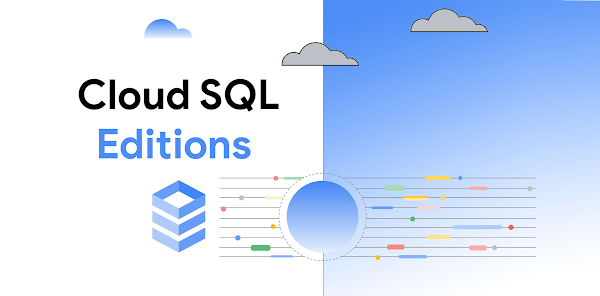Cloud SQL is Google Cloud’s enterprise-ready, fully managed database service for running MySQL, PostgreSQL and SQL Server workloads. It’s used across industries from digital services to banking to retail, with more than 95% of Google Cloud’s top 100 customers using Cloud SQL today. As more demanding workloads move to the cloud, some of you have been asking us for higher performance and availability. In addition, you’ve been asking us for more choice and flexibility to optimize your configurations for your individual workload needs.
Today, we’re announcing the Cloud SQL Enterprise Plus edition for MySQL and PostgreSQL, featuring three major enhancements. First, we have significantly accelerated both read and write performance with a variety of software optimizations, improved machine types and configurations, and an integrated SSD–backed data cache option. With Cloud SQL Enterprise Plus for MySQL, we deliver up to 3x higher read throughput and up to a 2x improvement in write latency compared to the current Cloud SQL offering. Second, we deliver near-zero downtime for planned maintenance operations and a 99.99% availability SLA inclusive of maintenance to satisfy your availability goals for your business-critical applications. Third, we enhanced the data protection capabilities with 35 days of log retention, a must-have for all organizations with strict compliance requirements. Cloud SQL Enterprise Plus edition addresses these needs while building on the already proven capabilities of Cloud SQL.
The existing version of Cloud SQL will continue with no changes to features or pricing, but will now be known as the Cloud SQL Enterprise edition.
Exploring the innovations in Enterprise Plus for MySQL
Cloud SQL Enterprise Plus for MySQL delivers superior performance through co-optimized hardware and software configurations while maintaining full open-source compatibility. For read-intensive transactional workloads, Enterprise Plus edition for MySQL, with configurable data cache, delivers up to 3x higher read throughput compared to Enterprise edition. Data cache leverages flash memory as a way to transparently extend caches based on DRAM, lowering read latency, improving throughput and scaling to larger data sets. Additionally, software optimizations deliver up to a 2x reduction in transaction commit latency and up to a 2x improvement in write throughput, making Cloud SQL the best destination for your most demanding MySQL workloads.
“We are delighted to join forces with Google Cloud in launching Cloud SQL Enterprise Plus edition for MySQL,” says Jonathan Blais, CTO and Co-founder of Everflow Technologies. “This new edition has enabled us to immediately reap the benefits of enhanced performance, availability, and data protection without making any modifications to our application. In particular, we have observed more than 3x improvement in query performance for clients who run intensive reports on our platform after incorporating the Data Cache. We look forward to partnering with Google Cloud and Cloud SQL on future innovations.”
Availability and reliability are a key focus and Cloud SQL Enterprise Plus edition offers a 99.99% SLA, inclusive of maintenance. During planned maintenance, Enterprise Plus instances use rolling updates behind the scenes and additional hardware resources to reduce downtime to less than 10 seconds.
Enterprise Plus edition also provides a higher level of data protection, with 35 days of log retention for point-in-time-recovery, supporting demanding regulatory needs and data protection requirements that your business critical workloads need.
“At Workday, it’s important to be able to offer great user experience to our customers and as we moved to the public cloud, it was clear that we needed a high-performance database to support our requirements. We worked closely with the Google Cloud team to invest in Cloud SQL improvements and with the launch of the Cloud SQL Enterprise Plus edition, we now have options for high performance and availability for our most demanding Workday workloads, leveraging the higher read and write performance, higher availability, and minimal planned downtime. We are really excited to co-innovate with Google and benefit from these new capabilities along with Enterprise-grade features of the managed services,” says Chirag Andani, VP, Persistence and LifeCycle Engineering at Workday.
Enterprise Plus for PostgreSQL
Cloud SQL Enterprise Plus for PostgreSQL delivers up to 2x improved write throughput compared to Enterprise edition. Similar to the MySQL offering, Cloud SQL Enterprise Plus for PostgreSQL co-optimizes hardware and software to deliver this improved performance.
All of the availability, reliability and data protection enhancements mentioned for MySQL, are also available with Cloud SQL Enterprise Plus for PostgreSQL: a 99.99% availability SLA inclusive of maintenance, reduced planned downtime of less than 10 seconds, and a higher level of data protection with 35 days of log retention.
“Partnering with Google Cloud and using Cloud SQL Enterprise Plus edition for PostgreSQL has allowed us to immediately take advantage of increased performance, availability and data protection while maintaining the open-source PostgreSQL compatibility that our applications require. With our very first workload, we saw 2x improvement in sustained performance (TPS and query latency) out of the box,” says Richard Helms, Manager, Database Engineering, Salesloft.
Learn how to supercharge your applications with Cloud SQL Enterprise Plus, the new edition designed to run business critical transactional workloads.
Getting started
Cloud SQL Enterprise Plus edition is now available in select Google Cloud regions via gcloud and API and will be available in the cloud console by July 17, 2023. Cloud SQL Enterprise Plus edition for SQL Server will follow later.
Getting started is easy: visit the Cloud SQL console and create a database instance with just a few clicks. New Google Cloud customers can create a free trial instance and get $300 in free credits. To learn more about Enterprise Plus edition, see our documentation.
Cloud BlogRead More


